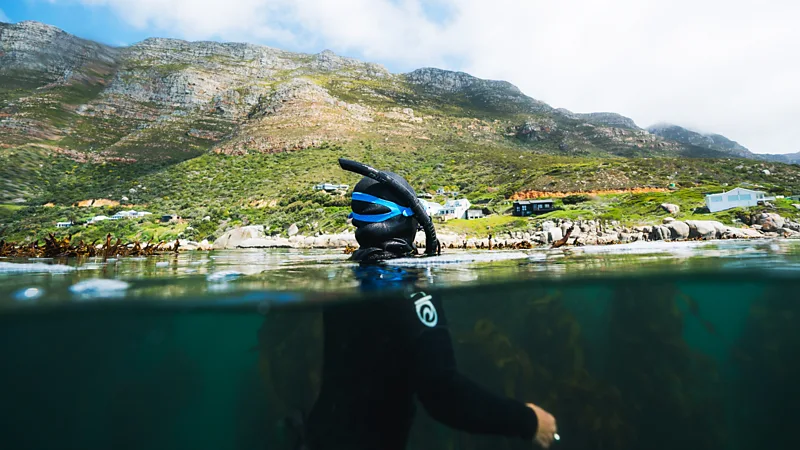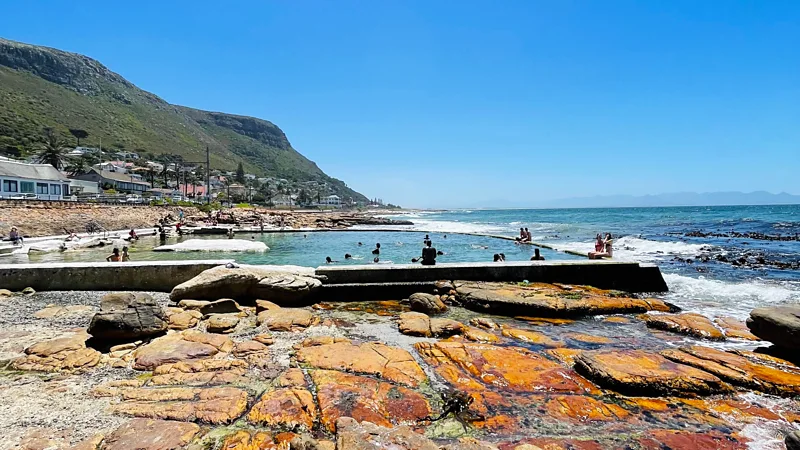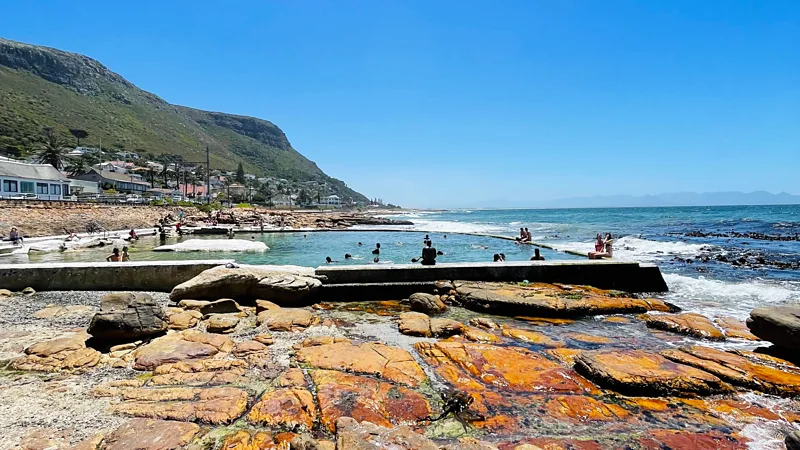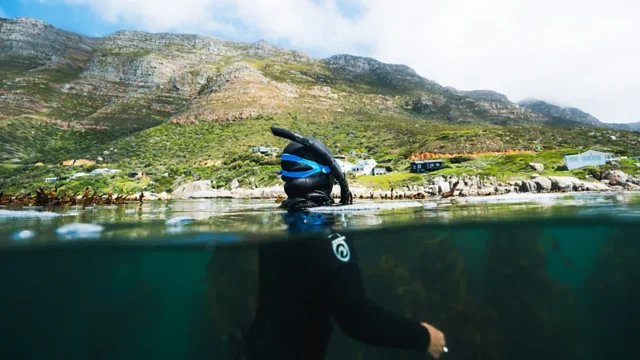Introduction; Cape Town coastal adventures
Renowned documentarian Craig Foster, best known for his Oscar-winning documentary “My Octopus Teacher,” offers an insider’s perspective on Cape Town’s most exhilarating underwater and coastal experiences. With a deep connection to the ocean, Foster shares his favorite activities in Cape Town, from freediving in kelp forests to exploring tidal pools teeming with marine life.
Cape Town: A Coastal Haven Rich in History
Cape Town, located at the southern tip of Africa, is surrounded by the vast Atlantic and Indian Oceans. The city’s history is deeply intertwined with its coastline, dating back to the Indigenous Khoekhoe and San peoples, who lived off the land and sea long before it became a Dutch East India Company outpost. Today, Cape Town’s residents continue to maintain a close relationship with the ocean, embracing a lifestyle filled with outdoor adventures. From hiking to surfing and diving, the city’s diverse landscape offers endless opportunities for exploration.
Craig Foster: A Life Devoted to the Ocean in Cape Town coastal adventures
Craig Foster is a celebrated naturalist, filmmaker, and co-founder of the Sea Change Project. With over 150 international awards to his name, including an Academy Award, Foster has dedicated his life to documenting the wonders of the ocean. His latest book, Amphibious Soul: Finding the Wild in a Tame World, delves into the importance of reconnecting with nature. Foster’s passion for the ocean is evident in his daily routine, which includes diving every day of the year.

Freediving and Snorkeling at Windmill Beach
For those interested in snorkeling and freediving, Windmill Beach on the Cape Peninsula is a must-visit. Foster, who begins each day with a dive, recommends this spot for its calm waters and rich marine life. The beach is part of a protected area, ensuring that fishing and marine harvesting are prohibited, allowing divers to enjoy an untouched underwater ecosystem. Here, you can expect to encounter various species of seaweed, kelp, fish, octopus, and even small sharks. Foster advises beginners to dive on the False Bay side of the peninsula, where conditions are generally calmer. While Cape Town’s waters can be chilly, Foster embraces the cold, noting the invigorating effects it has on the body and mind. After a dive, he often relaxes on a sun-warmed boulder before enjoying a traditional South African braai (barbecue) by the ocean.
Wildlife Tracking in Cape Point Nature Reserve
Cape Point Nature Reserve, located at the southern end of the Cape Peninsula, is another of Foster’s favorite spots. The reserve is home to the Cape of Good Hope and is teeming with wildlife, including Chacma baboons and Cape clawless otters. Foster is particularly passionate about tracking, a skill he believes offers a unique window into the past and future. By observing animal tracks and behavior, he explains, one can gain insights into the natural world and even predict future events, such as impending storms. Visitors to the reserve can also explore the Origins Exhibit at the Buffelsfontein Visitors Centre, where Foster’s work with the Sea Change Project is showcased.
Exploring Cape Town’s Tidal Pools
For those new to ocean activities, Cape Town’s tidal pools offer a safe and accessible way to experience marine life. These natural swimming pools, scattered along the coastline, are constantly replenished by the sea and provide a controlled environment for beginners and families with children. Foster highlights the diverse marine life found in these pools, including octopuses and other fascinating creatures. He suggests visiting early in the morning to avoid crowds and encourages visitors to take a moment to float on their backs and enjoy the tranquility of the surroundings.

Surfing and Body Surfing at Muizenberg Beach in Cape Town coastal adventures
Muizenberg Beach is a popular destination for surfers and body surfers alike. Known for its gentle waves, it’s an ideal spot for beginners looking to learn the ropes. While Foster prefers body surfing, he also enjoys the rush of dopamine that comes from riding the waves. The beach is a hub for surf lessons and is also suitable for kayak-surfing, which Foster describes as a unique and enjoyable experience. For windsurfing or kitesurfing, he recommends Blouberg Beach or the flat lagoon at Langebaan, both of which offer consistent wind and stunning views.
Mountain Biking on Tokai Trails
Cape Town is a haven for cyclists, with scenic routes that offer breathtaking views of the ocean and mountains. While the iconic Chapman’s Peak Drive is a favorite among road cyclists, Foster suggests exploring the mountain biking trails in the Tokai Forest for a more off-road experience. These trails wind through lush fynbos vegetation and offer varying levels of difficulty, making them suitable for cyclists of all skill levels. Another recommended route is the Silvermine Loop, which provides panoramic views of the surrounding landscape and sea.
Whale Watching in False Bay in Cape Town coastal adventures
Winter in Cape Town coincides with the beginning of whale season, making it the perfect time to head out on a whale-watching tour in False Bay. The bay is a sanctuary for various whale species, including southern right whales, Bryde’s whales, and humpback whales. Foster emphasizes the importance of respecting the environment and encourages visitors to get involved in conservation efforts, whether through beach cleanups or volunteering with local organizations. The nutrient-rich waters of False Bay are also home to a diverse array of marine life, including dolphins, mola mola, and even orcas.
Visiting the African Penguins at Boulders Beach
No visit to Cape Town would be complete without a trip to Boulders Beach, home to a thriving colony of African penguins. These charismatic birds have become a major attraction, thanks to successful conservation efforts that have helped their numbers grow to around 3,000. Despite their popularity, African penguins are endangered, and Foster advises visitors to give them plenty of space. The beach, managed by SAN Parks, offers viewing platforms and boardwalks that allow visitors to observe the penguins without disturbing them.

Hiking and Wildlife at De Hoop Nature Reserve
For those with extra time, a visit to De Hoop Nature Reserve, located about three hours outside Cape Town, is highly recommended. This remote reserve is a biodiversity hotspot, offering visitors the chance to see a wide range of wildlife, including herds of eland, bontebok, and ostriches. The reserve also features numerous hiking trails, as well as rock pools that are perfect for exploring at low tide. With a ban on fishing in place for over 30 years, the area is teeming with marine life, making it a unique destination for nature lovers.
Conclusion: Embrace the Wildness of Cape Town’s Coastline
Cape Town’s coastline offers a wealth of adventures for those looking to reconnect with nature. From the thrill of freediving in kelp forests to the serene experience of floating in a tidal pool, there is something for everyone to enjoy. Craig Foster’s passion for the ocean and dedication to conservation serve as a reminder of the importance of preserving these natural wonders for future generations. Whether you’re a seasoned adventurer or a beginner looking to dip your toes in the water, Cape Town’s coastal treasures are waiting to be explored.











